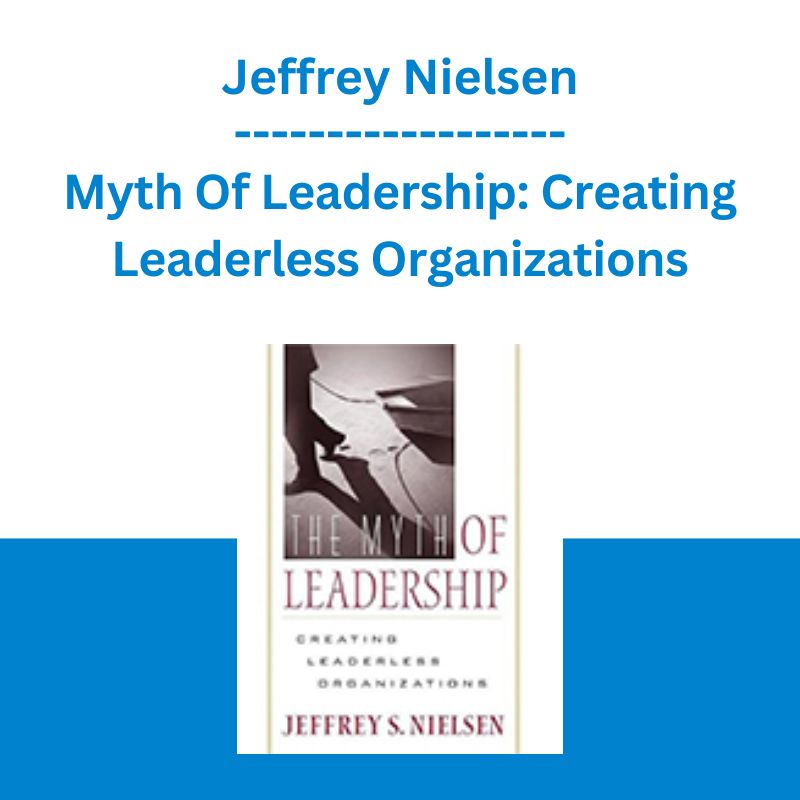*** Proof of Product ***
Exploring the Essential Features of “Myth Of Leadership: Creating Leaderless Organizations – Jeffrey Nielsen”
When we join an organization, we’re immediately slotted into a hierarchy based on a rank-based system of “leaders” and “followers.” We then make false assumptions about our place in these hierarchies that divide our efforts, limit our growth opportunities and rob us of meaningful, dignified work. These assumptions are what Jeffrey Nielsen calls the “myth of leadership.” In this unconventional book, Nielsen calls for an end to “rank-based” organizational structures, which foster secrecy and miscommunication and steal the joy from work, while breeding corruption and abuse of power. Nielsen’s new model is the “peer-based” organization, which uses rotating peer leadership councils and crossfunctional task forces to manage the organization’s work. These new entities are better suited to making decisions based on the organization’s competencies and customer needs, rather than on static functional groups or other artificial divisions. Nielsen’s experience with dozens of organizations showed that while workers were universally motivated to make their organizations profitable, artificial barriers consistently prevented them from reaching their potential. Real-world examples from contemporary peerbased organizations help make his point for creating leaderless organizations.
Editorial Reviews
Review
What you’ll learn: Peer-based thinking and decision-making organizations are more effective than rank-based, bureaucratic firms.―Chicago Tribune
A book that challenges my thinking keeps me reading. Therefore, I recommend this book. Provides practitioners with a useful model.―Training Media Review
A revolutionary work. Nielsen outlines an escape from the ego-nomics of todayâ??s organizations. Without change, the cost of feeding these beasts will devour us. Nielsen tells us how to avoid being their next meal.―Robert G. Crawford, Associate Professor, Marriott School, Brigham Young University
Arguing that “rank-based hierarchies” are counterproductive, the author uses real world examples to demonstrate this principle.―Forecast
Jeffrey Nielsen cogently points out that the emperor-leader has threadbare clothes, and at the same time he empowers the rest of the workforce with the broadcloth of effective, peer-based teamwork. Buy one copy for yourself, another for your boss, and go to work!
Nielsenâ??s insights made all the difference for us. Dissolving rank-based leadership and sharing previously closely held information unleashed and empowered everyone in our organization. The company was reinvented and launched is a new and prosperous direction.
Offers guidance as to how companies can gradually introduce peer-based concepts.―CIO Magazine
The book outlines how rank-based organizations develop, and identifies three management vehicles you need to start a peer-based organization.―HR Magazine
Though readers ask how this idea would work in reality, there is no doubt…not a bad place to start.―Training Magazine
Very timely and powerful. This is serious brain food for business and one of the best books of the year!―The CEO Refresher
What is worth paying attention to here is his belief that organizations invest too much power in senior leadership.―CIO Insight
About the Author
Jeffrey S. Nielsen is an internationally recognized consultant whose firm, Intellectual Capital Development, helps individuals act strategically and think like business owners. Previously, he worked with the Franklin Covey Company and Right Management Consultants, an international outplacement and consulting firm.
Product details
Publisher : Nicholas Brealey America
Language : English
Paperback : 208 pages
About the author
Jeffrey S. Nielsen
Jeffrey Nielsen explores existential questions and experiences through his writing. He is a philosopher educated at Weber State University and Boston College. At Boston College, Jeffrey was a Teaching Fellow where he taught courses in logic and critical thinking, the history and philosophy of art and science as well as in ethics and epistemology. He has also taught in the philosophy department at Brigham Young University, where he taught courses in the ethics of leadership, reasoning and writing, as well as in the history and development of science.
Jeffrey also consults with organizations around the world on management issues and assists organizations in developing peer-based managing, moral decision-making, and ethical problem solving models. Professor Nielsen has traveled internationally training with many of the Fortune 500 companies. His book, The Myth of Leadership: Creating Leaderless Organizations, offers a new paradigm in peer-based management.
His most recent book, Deconstructing the Supermeme of Leadership: A Brief Invitation to Creating Peer-based Communities & Leaderless Organizations,presents a more philosophical and historical account of his peer-based model.
He is also experimenting with a new genre of fiction he is calling a “Literary Suite.” Jeffrey defines a literary suite as four short, self-contained, stories that follow one another, and all of them explore a common idea or share a common theme. They may be preceded by a prelude or overture (conventionally called an introduction), which may introduce the shared theme of the four pieces. The Literary Suite is an excellent way to mine one’s imagination to explore any interesting theme or topic. Anyone, regardless of his or her skill as a writer, will find this literary style useful and find themselves able, in four short narratives, to study an idea of his or her choice. His hope is that the Literary Suite will open up writing to a vast new group of both writers and readers and unleash a tsunami of creative imagination.
Jeffrey teaches philosophy at both Utah Valley University and Westminster College of Salt Lake City
Customer reviews
LibSL
Five Stars
I found this very useful in analyzing the way managers lead.
Joseph Albey
A Must Read For Organizational Consultants!
This book presents some profound ideas with world changing implications, and does it in an easy to read style that completely moved me! I will never view “leaders” or “leadership” as I once did. After reading this book, I have found myself suddenly challenging anyone who glibly used the word “leadership” to promote their agendas. The author’s argument that we create a dualistic and unhealthy world whenever we uncritically accept our own leadership over others or their own over us, has completely changed my approach to organizational consulting. His suggestion as well that we do less soft skills training and more hard skills like decision-making and strategic thinking makes sense. I also appreciated his advice to trust more in the tacit wisdom of our own employees over the expertise of outside consultants.
Please see the full list of alternative group-buy courses available here: https://lunacourse.com/shop/










 Chris Capre - Advanced Price Action Ongoing Training & Webinars
Chris Capre - Advanced Price Action Ongoing Training & Webinars  Oliver Velez - Essential Strategy Of Trade For Life
Oliver Velez - Essential Strategy Of Trade For Life  Emanuele Bonanni - My Trading Way
Emanuele Bonanni - My Trading Way  Fred Haug - Virtual Wholesaling Simplified
Fred Haug - Virtual Wholesaling Simplified  Geoff Futch & Alex Viada - HPA CORE Coaching Fundamentals
Geoff Futch & Alex Viada - HPA CORE Coaching Fundamentals  Dave Landry - Stock Selection Course
Dave Landry - Stock Selection Course  Atlas API Training - API 570 Exam Prep Training Course
Atlas API Training - API 570 Exam Prep Training Course  James Waslaski - Elite Sports Therapy - The Massage Mentor Institute
James Waslaski - Elite Sports Therapy - The Massage Mentor Institute  Matthew Kratter - Trader University
Matthew Kratter - Trader University  Jesse Livermore Trading System - Joe Marwood
Jesse Livermore Trading System - Joe Marwood  Erik Banks - Alternative Risk Transfer
Erik Banks - Alternative Risk Transfer  Ed Ponsi - Forex Trading
Ed Ponsi - Forex Trading  Crypto Dan - The Crypto Investing Blueprint To Financial Freedom By 2025
Crypto Dan - The Crypto Investing Blueprint To Financial Freedom By 2025  Team NFT Money - Ultimate NFT Playbook
Team NFT Money - Ultimate NFT Playbook